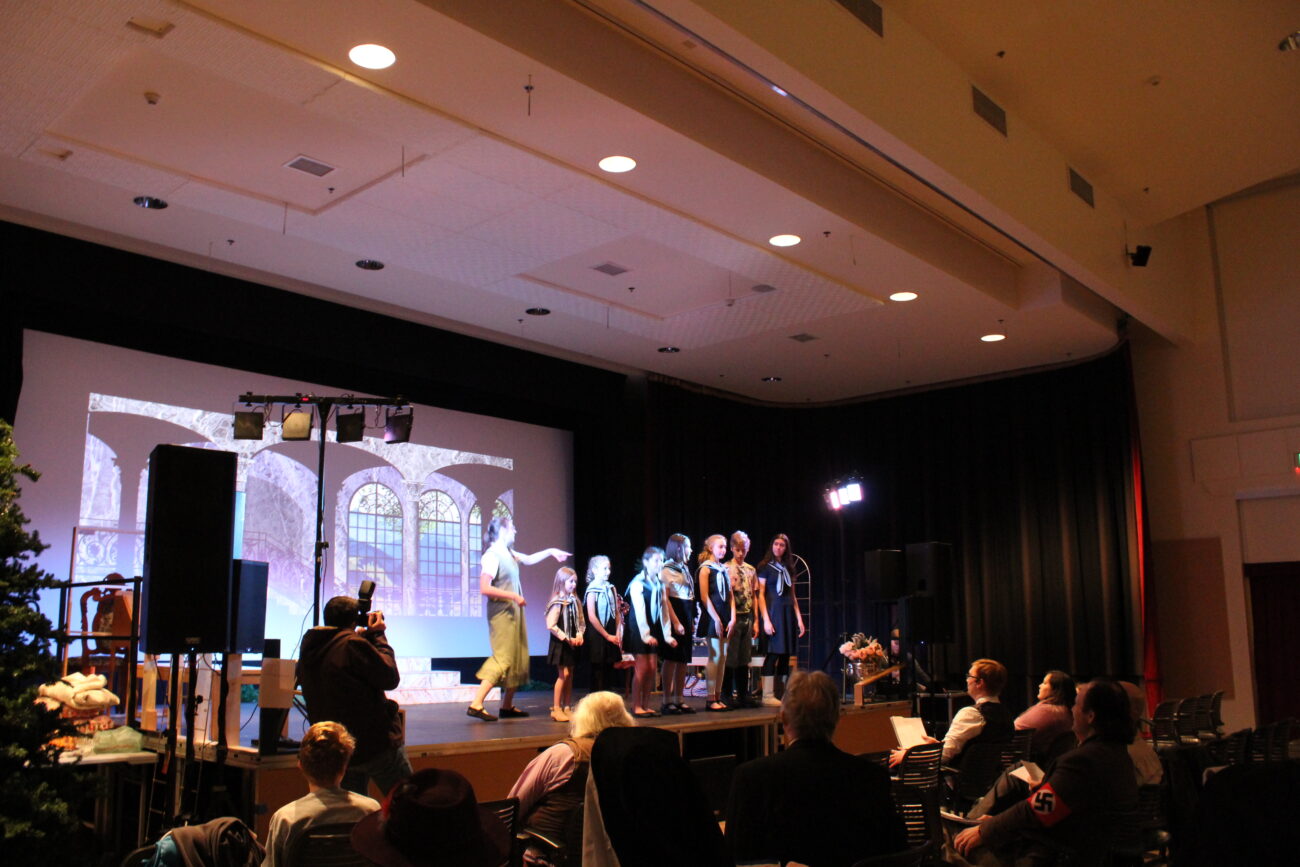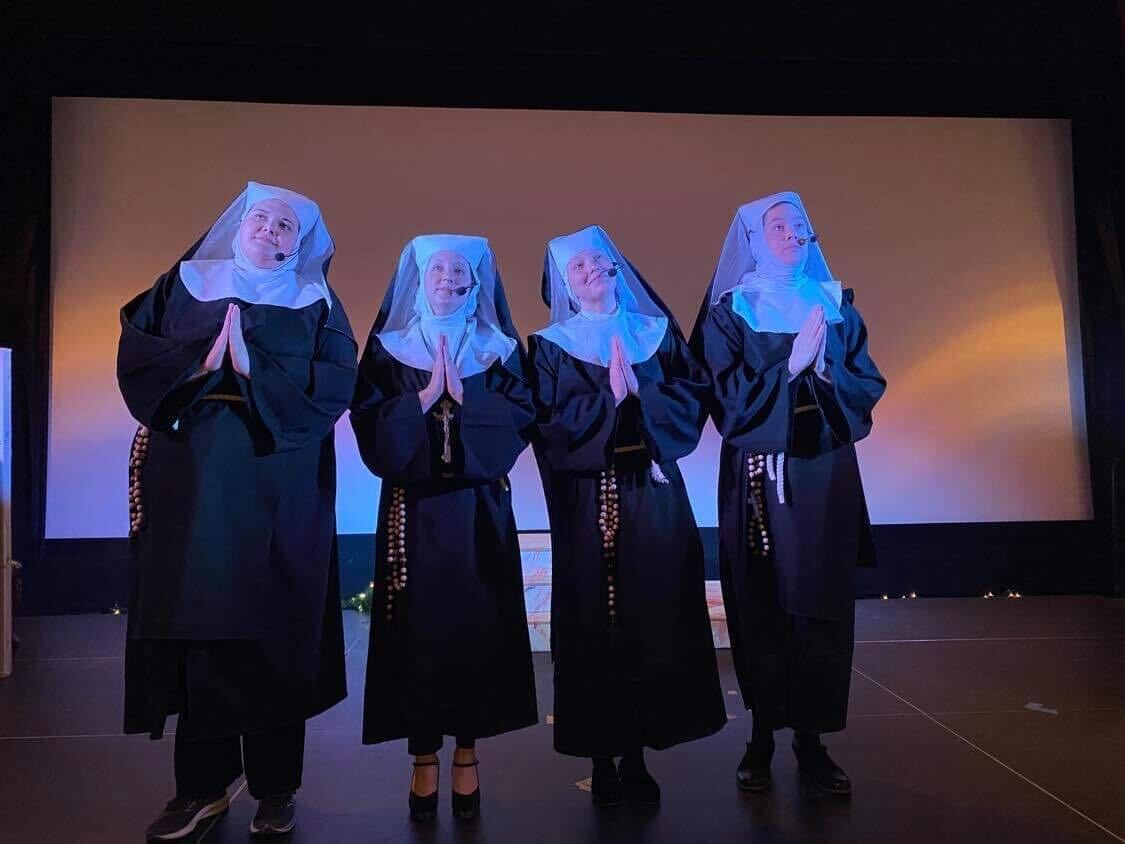
(Sage Smiley / KSTK)
In a small town, it takes a village to pull an event together. That’s especially true when the event is the first community theater production in more than two decades.
More than 40 Wrangell residents are helping bring the musical “The Sound of Music” to the stage this week (December 2). To give an inside look, KSTK reporter Sage Smiley dons a different hat – a nun’s wimple, to be precise.
Community theater productions bring in actors and crew from all over the community. I’d know – I’ll be performing in my first-ever community production this week: an abridged version of Roger and Hammerstein’s “The Sound of Music” as one of the nuns.
Haley Reeves plays the Mother Abbess. She says community theater is a unique experience.
“You get people from different walks of life, and people who maybe wouldn’t hang out outside of this,” Reeves explains, “And we all come together, and we get along, and everybody’s just been in the same headspace and working together. It’s been really, really great.”
The actors are all ages. Only two of the seven Wrangell kids playing the Von Trapp children are siblings in real life (Clara and Mariah Carney, playing Louisa and Marta, respectively). The others are, in order of age: Leisl (Alana Harrison), Friedrich (Brogan Booker), Kate (Silje Morse), Brigitta (Amura Roher) and Gretl (Kastle Powers).
The actors playing Maria and Captain Von Trapp are married (Sarah and Andrew Scambler) – and they met while singing. The nuns are a radio reporter (myself, Sage Smiley), the public school art and music teacher (Tasha Morse), a massage therapist (Ellen Jellum), and Reeves, who works at a local bank.

(Courtesy Tasha Morse)
Reeves is originally from Havre, a town of about 10,000 people in central northern Montana. She grew up participating in community theater – she’s been in 15-20 shows – and says it’s something she deeply missed after moving to Wrangell in 2018. It wasn’t a question whether to try out when she heard a few locals were trying to revive community theater in town.
“I honestly didn’t really have any expectations, because I had heard that we hadn’t done [a play] in 20 years. So I think the thought was: ‘I hope that enough people are interested that we can pull this off,’” she says, “And so as we’ve grown, and as we’ve gotten everybody to fill the roles, it’s more than exceeded expectations.”
She explains that’s “because these are people that care, they want to put on a good show, we want people to enjoy it. And hopefully enough to the point where we can keep doing stuff like this and offer it [in the future].”
Director Tom Jenkins agrees. The show, which opens December 2, has far exceeded his expectations. That’s in large part due to the amazing volunteerism of Wrangell, he says. Between the cast and crew, more than 2% of the island’s 2,100-person population is involved in getting “The Sound of Music” off the ground.
“I thought costumes would be extremely simple, like maybe a feather in a hat, sort of like you’re doing in a junior high play,” Jenkins explains of his initial vision. “That’s what I was expecting, but we’ve got a Broadway-type look here, and that’s a big change. [The] staging and costumes are totally different than what I envisioned at the beginning because I was envisioning really amateur theater. But people in this town – they’re artists.”
The process has been full of surprises, Jenkins says: “One was how quick the kids learned their routine for Do-Re-Mi, it’s a fairly complicated routine. I had two pages of notes, as I put together, choreographed the thing, mostly copying what I saw from “Sound of Music” with Julie Andrews. They just picked it up so quickly I was able to put away the notes after the very first time.”
At a recent dress rehearsal, the three-part song ran smoothly, but there are still some things to iron out. First and foremost, the Von Trapp children didn’t have microphones. Those were still on their way to Wrangell Island. (Never fear, the mics have since arrived).
Jenkins adds that the cast in general have been “surprisingly good singers.”
“That’s really surprised me,” he says. “The nuns – I don’t see how you could have a better quality of singing in any kind of professional theater, even, than what the nuns have done. It’s really, really impressive.”
The conclusion, Jenkins says, is that “everyone needs to come. You’ll be surprised.”
A ticket to Wrangell’s “Sound of Music” will be $20, available online and in-person before the shows. Jenkins says he knows it may seem steep, but it’s a lot of money to purchase the rights to a play, and to pull together proper sound equipment, even with donated costumes and sets and volunteers helping out.
“I’m always amazed how somebody like Roger and Hammerstein’s great-grandchildren are still making so much money from their play. I think I need to write a musical so that my great-grandchildren…” he trails off. “But anyway…”
Reeves says there’s a lot that goes into a show that the audience won’t ever see, unless something goes south.
“I think what’s hard for people to realize if they’ve never done theater,” she explains, “And they come to watch a show, is to know that you might notice a tiny mistake here or there, but you don’t understand all the work that came in just getting to that point. And oh, my gosh, what could have gone wrong, you know what I mean?”
In addition to the actors on stage, Reeves points out, there are the people running microphones, hitting the sound cues, doing lighting, changing backgrounds and set pieces, plus a whole host of volunteers who made those sets, helped sew and alter costumes, and are lending equipment to make the show work.
“There’s all these roles that are filled that you don’t actually get to see them doing,” Reeves says. “It’s a big project for everybody to come together on.”
Of course, she says there are nerves, especially here in the home stretch: “It’s always like – the week and the night before – it’s just like, ‘Can we do this? Are we gonna do this? We’re gonna do this.’”
Jenkins says community theater is important – that’s why he stepped up to direct the first community production in Wrangell since the late 1990s.
“It’s exciting, good for the town, good for the young people,” Jenkins says. “Look at all these young people that are singing and dancing at a fairly high level – the choreography and stuff. I mean, what kid in Wrangell in the last 20 years has got to perform at this level? They probably will never go to Hollywood, but they’ll always remember this kind of stuff. But we need to support it if we’re going to keep doing it.”
One essential element of community theater that’s in seemingly short supply: boys in Wrangell who will sing. One of the Von Trapp roles was gender-bent because not enough young men tried out. Jenkins says he hopes that seeing a performance will help motivate some more kids of all ages to check out theater.
“We struggled to get a boy,” Jenkins explains, “So that would be a goal for future, is to get a couple of young guys”
“So,” he continues, “Bring your sons to this performance so that they get involved in theater. It’s very macho and fun.”
In addition to the experience itself, Reeves says community theater – especially in a small town like Wrangell – offers people a new perspective on their friends and neighbors.
“I work at the bank, and I’m sure – depending on who’s coming – they’ve never seen me except behind the desk. And it’s like, ‘Whoa, I didn’t even know that you enjoyed theater,’” she says. “In a small town, it’s hard to get out of your box sometimes because people see you here or there, and that’s just kind of where they keep you, is in that box. Theater being here opens up that box for people to get to know everyone in a new light.”
Reeves adds community theater can also be genuinely life-changing.
“If you give it a chance, theater can be really moving and you never know when it will move you or what it will do,” she says. “Maybe you just come at it with: ‘Yeah, that was fun.’ And maybe you come in, you’re like, ‘Oh my gosh, I want to do the next one,’ you just never know what one show could inspire.”
“Hopefully, she adds, “It inspires more shows.”
Jenkins says he’ll probably step away from directing after this play, and let other talented Wrangell folks helm the future of community theater here. And for her part, Reeves says she wants to help keep community theater going.
“We definitely want to keep doing it, if we’re successful. I’m hoping it’s going to be, I feel like it is going to be,” Reeves muses.
“No,” she concludes, “It is going to be, let’s go with that.”
She laughs.
Plus, in a way, having a show in Wrangell for the first time in much of the cast’s lifetime is a success in and of itself.
Break a leg, Wrangell’s “Sound of Music!”
Purchase tickets for Wrangell’s production of “The Sound of Music” online here or at the door. Performances are Friday, December 2 at 7 p.m. or Saturday, December 3 at 4 p.m.
Get in touch with KSTK at news@kstk.org or (907) 874-2345.











